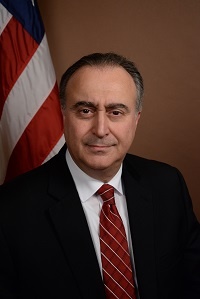
Are “Jungle Primaries” the answer to reform the calcified Rhode Island Electoral System?
State Representative Arthur “Doc” Corvese (D-55) thinks so. Rhode Island Republican State Chair Sue Cienki begs to differ.
In a “Jungle Primary”, primary elections effectively create a runoff between the two candidates who receive the most votes, regardless of party affiliation. Proponent’s claim “Switching to an open format, says Representative Corvese, would ensure that elected officials have the support of at least half of their electorate.”
In California, easily the largest stage for this style of run off, the results have been inconclusive … with increased polarization seen as the clearest outcome so far
Rhode Island Republican State Chair Sue Cienki Responds:
“Doc” Corvese’s bill is also known as a “Jungle Primary” in which candidates from all parties and independent candidates all participate … the top two vote getters going on to a general election.
In a general election typically more voters vote, so effectively their choice is limited to candidates that were top vote getters in a primary. For a Republican district you could end up with 2 Republicans and no Democrat, Libertarian, or Independent candidate. In a Democratic district that exact opposite effectively cutting out candidates from Minor parties or Independents that would provide voters with a choice
Proponents of a jungle primary think it will make candidates be more moderate but so far that has not come to fruition ,and California presents us with enough data to prove that isn’t happening
When it comes to election reform be careful what you ask for.
From Representative Corvese & The General Assembly:
Legislation sponsored by Rep. Arthur Corvese would open up primary elections in Rhode Island to all candidates and voters, forging a new path for elections that would ensure that no candidate is elected to state or municipal offices without the support of a majority of their constituents.
Under the bill (2022-H 6622), which has a hearing before the House Committee on State Government and Elections tomorrow after House session, the party primary system would be replaced with a “general primary” in which all declared candidates are listed, and the top two vote-getters for each office face off in the general election.
Currently, Rhode Island’s primaries are party affairs in which voters must choose whether to participate in the Democratic primary or the Republican one and select only that party’s nominees. Participation affiliates the voter with that party unless they disaffiliate after they cast their vote.
Switching to an open format, says Representative Corvese, would ensure that elected officials have the support of at least half of their electorate.
“As we’ve seen here in Rhode Island, it’s possible to win even the governorship with much less than half of voters’ support. That’s not much of a mandate, since a majority of voters actually voted against the candidate who won,” said Representative Corvese (D-Dist. 55, North Providence). “With an open primary, the candidate who ultimately wins must earn the trust of at least half of the voters. It’s a way of ensuring the candidate truly represents the will of the majority of voters.”
Two of Rhode Island’s recent governors were elected with less than 50 percent of the vote: Gina Raimondo in 2014, with 40.7 percent; and Lincoln Chafee, who took office in 2010 with just 36.1 percent of the vote.
The legislation would apply to all elections for state offices as well as local races. Under it, all candidates, regardless of party affiliation, would be listed on a single general primary ballot. All voters, regardless of their party affiliation (or lack thereof) would be eligible to vote in that general primary.
For each office up for election, the top two vote-getters in the primary would be listed on the general election ballot. In cases where there are multiple seats to fill, as is often the case for city and town councils and school committees, the number of candidates who advance would equal twice the number of available positions. So, if a town were electing three council members, the top six candidates in the general primary would advance to the general election.
The legislation would not cut political parties out of the system. Candidates would still be allowed to have their party affiliations, and their endorsement by that party, if applicable, listed on the ballots in both the primary and general elections.
Representative Corvese also introduced the bill last session on June 24, before candidates for governor began announcing.
While he said he expects that discussions during the upcoming committee process will probably generate ideas to fine tune the bill, the goal of the bill is to settle on a process that allows better representation of the will of the majority of Rhode Islanders.
H6622 Corvese Jungle Primary Bill







Comments